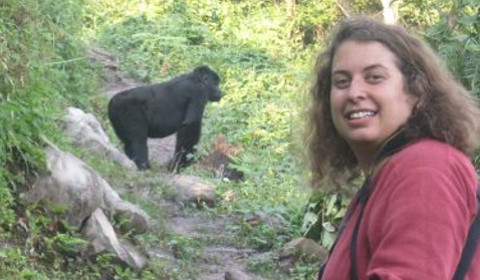
Jessica Rothman in Uganda.
By Richard Morris ’20
This Fall semester the Biological Sciences Department welcomed Jessica Rothman, a professor and primatologist at Hunter College in New York City, for a public lecture about her research.
Rothman’s studies, which have focused primarily on the forests of Uganda since 1997, deal with the nutritional ecology of primates, specifically on how they relate to their environment through dietary interaction. The nutritional habits of any animal are strongly intertwined with their sociability, movement, and physical health. With this in mind, Rothman’s work is deeply embedded in Ugandan conservation movements, through governing bodies such as the Uganda Wildlife Authority.
The bulk of Rothman’s lecture dealt with her research into nutrient balancing and the protein and non-protein energy consumption of primates. The ideal diet of a primate should provide a relative balance between these two sources of nutrition, but that may not be attainable given the available food sources in East African jungles. Rothman’s research suggests that in times of fruit scarcity, some primates such as gorillas may overfeed on protein rich foods in order to attain energy. The extensive data she and her colleagues have collected center around foods which primates are observed eating, as well as fecal samples which provide an insight into which parts of their diet are digestible or indigestible.
Although the majority of her studies are centered in East African ecosystems, Rothman is quick to emphasize that there is extensive diversity among primates across the world. The prevailing image of a primate’s habitat may lie in an African jungle, but the reality is that they can be found across a wide range of climates: deserts, savannahs, snowy temperate forests, swamps, and so on. In addition, their diets are widely varied across carnivorous and herbivorous species; an Ethiopian bale monkey may live off the sustenance of vast bamboo forests, whereas chimpanzees are the only primate known to actively hunt for their meat.
Even after years of work in Uganda, Rothman’s studies are far from concluded. In her lecture she mentioned a few highlights for her future research. These include: the physiological effects of deviating from that ideal balance between protein and non-protein energy; potential flexibility which can exist in this dietary ideal; and how seasonal nutrient availability may affect a primate’s ability to maintain a healthy diet.
Rothman’s lecture provided a thought-provoking look into an area of biological sciences which is absolutely essential to better understanding some of the world’s most diverse ecosystems.















Comments